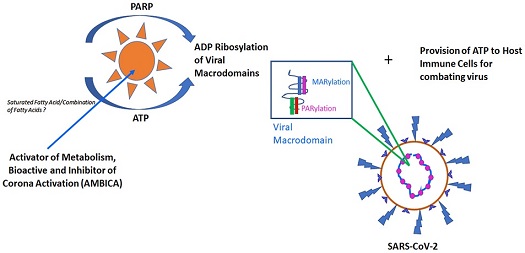French Researchers Unveil Critical Insights into SARS-CoV-2's De-MARylation Activity Through Macro1 Domain
Thailand Medical News Team Aug 08, 2023 2 years, 6 months, 2 weeks, 2 days, 8 hours, 49 minutes ago
COVID-19 Research: In a groundbreaking discovery, researchers from Aix Marseille Université, CNRS-France, and Université de Toulon-France have unraveled a key molecular mechanism that sheds light on the unique behavior of SARS-CoV-2, the virus responsible for the COVID-19 pandemic. Their study uncovers the role of a specific domain in the virus's non-structural protein 3 (NSP3), providing new avenues for understanding the virus-host interactions and potentially aiding in the development of antiviral strategies.
 SARS-CoV-2 - A Notorious Culprit
SARS-CoV-2 - A Notorious Culprit
Since its emergence in late 2019, SARS-CoV-2, the virus behind the coronavirus disease (COVID-19), has wreaked havoc across the globe. With a positive-sense single-stranded RNA genome spanning nearly 30 kilobases, SARS-CoV-2 belongs to the β-coronavirus genus, a group notorious for causing severe respiratory diseases. It is within this genomic complexity that researchers have now identified a critical domain within nsp3 i.e. the Macro1 domain that holds intriguing implications for the virus's interaction with its host.
The Macro1 Domain - A Molecular Nexus
Nsp3, the largest protein encoded by the SARS-CoV-2 genome, contains a well-conserved Macro1 domain. This domain has garnered significant attention due to its ability to bind to ADP-ribose, a small molecule involved in post-translational modifications. The
COVID-19 Research team were particularly interested in a specific amino acid residue within the Macro1 domain, known as F156 in SARS-CoV-2 and N157 in its close relative, SARS-CoV.
Unlocking the Role of F156
Employing a multidisciplinary approach, the study team embarked on a mutational study to unravel the significance of the F156 residue in SARS-CoV-2. Combining bioinformatics and structural analyses, they pinpointed this key residue as a potential player in the virus's de-MARylation activity - a process involving the removal of ADP-ribose molecules from target proteins.
Their investigation revealed that the exchange of the F156 residue significantly altered ADP-ribose binding and had a profound impact on de-MARylation activity. Through meticulous experimentation, the study team found that substitutions at this specific position impeded the binding of poly-ADP-ribose (PAR), disrupted mono-ADP-ribose (MAR) hydrolysis, and, strikingly, led to a 70% reduction in de-MARylation activity in the case of SARS-CoV. These findings provide a new dimension to our understanding of the intricate interplay between SARS-CoV-2 and its host.
Macro Domains and Host Immunity
Macro domains, a class of protein domains found across various organisms, have emerged as key players in the regulation of innate immunity. These domains possess ADP-ribose hydrolase activity, which enables them to counteract the effects of ADP-ribosylation - a post-translational modification that can influence protein function and interactions. The study teams' study sheds light on the potential impact of the F156 residue on the ability of SARS-CoV-2 to counteract host immunity and manipulate cellular processes.
>
Comparing SARS-CoV-2 and SARS-CoV
A fascinating aspect of this study is the comparison between SARS-CoV-2 and its predecessor, SARS-CoV. By analyzing the differences in the Macro1 domain's sequence and structure, the study team uncovered a significant divergence at the heart of the active site. The F156 residue in SARS-CoV-2 was found to correspond to N157 in SARS-CoV, suggesting a fundamental change in the binding pocket's orientation. This discrepancy likely contributes to the variations in ADP-ribose binding and hydrolysis kinetics between these two closely related viruses.
Implications for Drug Design and Beyond
The insights gleaned from this study hold promise for advancing our understanding of SARS-CoV-2's mechanisms and interactions within the host cell. The unique role of the Macro1 domain and its specific amino acid residues open up new avenues for the development of antiviral strategies. By targeting this domain and its activity, researchers could potentially devise novel therapeutic interventions that disrupt the virus's ability to manipulate host immunity and propagate.
As the COVID-19 pandemic continues to pose challenges to global health and well-being, research breakthroughs such as these pave the way for innovative approaches to combating the virus. The French researchers' meticulous study not only uncovers the intricacies of SARS-CoV-2's behavior at the molecular level but also provides hope for the development of effective treatments that could ultimately alleviate the burden of COVID-19 on society.
In conclusion, the study conducted by Aix Marseille Université, CNRS-France, and Université de Toulon-France represents a significant step forward in our understanding of SARS-CoV-2's mechanisms and its interaction with the host. By focusing on the Macro1 domain and its specific residues, the researchers have unraveled a molecular puzzle that could hold the key to novel antiviral interventions.
The study findings were published in the peer reviewed journal: Virology (Science Direct).
https://www.sciencedirect.com/science/article/abs/pii/S0042682223001587
For the latest
COVID-19 Research, keep on logging to Thailand Medical News
